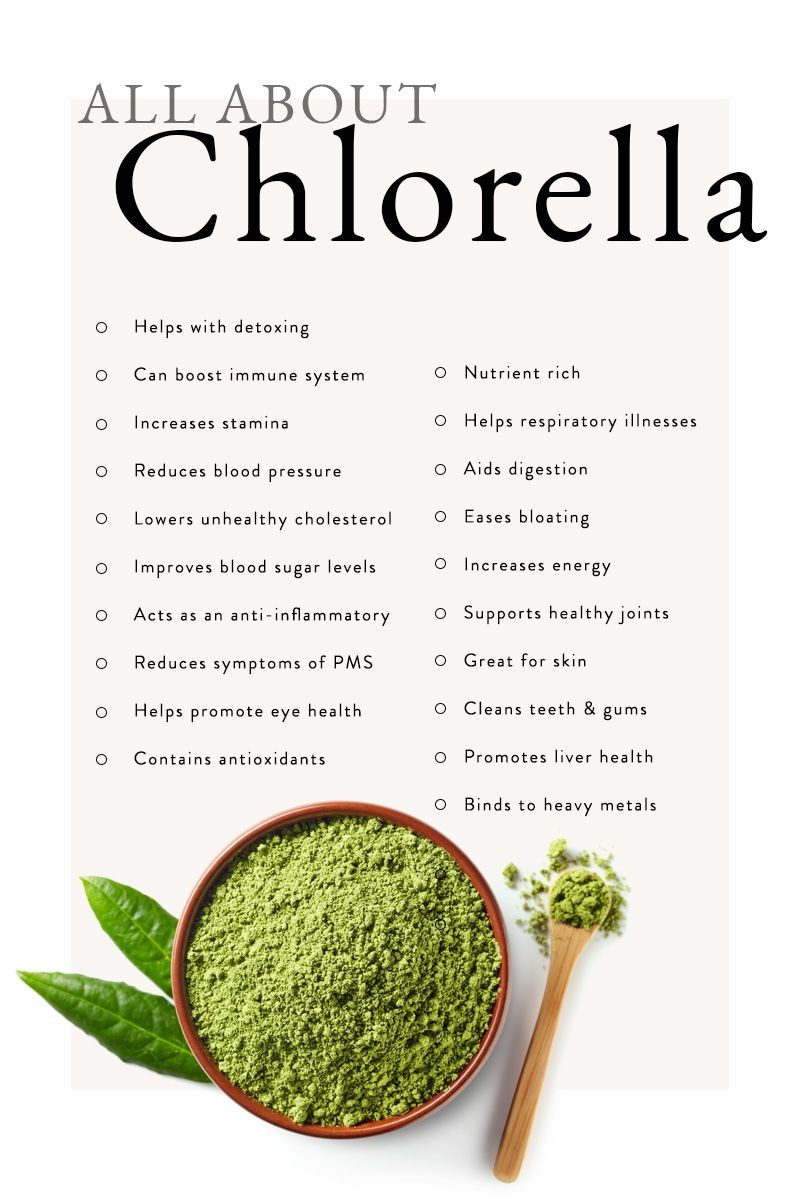
Contents
12 Impressive Health Benefits of Chlorella
Despite its health benefits, chlorella supplementation carries risks and side effects.
Chlorella, also known as green algae or freshwater seaweed, is a single-cell microalga native to Japan and Taiwan. It contains chlorophyll, a green pigment that uses sunlight to produce food through photosynthesis.
Chlorella is packed with essential nutrients, vitamins, minerals, fiber, proteins, and antioxidants. Consequently, it is considered a superfood and is available in the U.S. market as powders, pills, or extracts.
As chlorella has an indigestible cell wall, it is commonly consumed in supplement form or added to smoothies, soups, and dips like guacamole or hummus.
The nutritional content of chlorella
| Calories | 15 | 9.98 |
| Carbohydrates | 2 grams, 1% of DV | 1 gram, 1% of DV |
| Protein | 3 grams | 2 grams, 4% of DV |
| Vitamin C | 2% of DV | 130% of DV |
| Vitamin B12 | 250% of DV | – |
| Vitamin A | 60% of DV | 60% of DV |
| Calcium | 2% of DV | – |
| Iron | 70% of DV | 35% of DV |
In addition, chlorella contains other minerals and vitamins like Vitamin K, Vitamin D, omega-3 fatty acids, zinc, carotenoids, and polysaccharides.
QUESTION
12 impressive health benefits of chlorella
- Boosts immunity
- Studies show that chlorella enhances natural killer cell activity and stimulates inflammatory responses needed for fighting infections.
- Chlorella supplementation has been found to increase antibody synthesis, aiding in infection prevention and combatting disease-causing bacteria invasion.
- Improves cholesterol levels
- Research suggests that chlorella pills can reduce total and low-density lipoprotein cholesterol levels in the blood.
- Chlorella’s nutrients like niacin, fiber, antioxidants, and carotenoids have been linked to decreasing triglycerides in individuals with high blood pressure or slightly elevated cholesterol.
- Prevents cancer
- Chlorella stimulates cancer cell apoptosis or cell death. It also enhances the activity of natural killer cells, which aid in tumor rejection by the body.
- A specific protein found in chlorella, chlorella vulgaris culture supernatant (CVS), exhibits antitumor properties.
- CVS prevents tumor metastasis by stimulating T cells, preventing the spread of malignant cells from their origin.
- When activated, this protein facilitates the recruitment of T lymphocytes to tumor sites, preventing further tumor spread.
- Reduces high blood pressure
- A study on 80 individuals with normal-high blood pressure and borderline hypertension found that GABA-rich chlorella pills significantly decreased blood pressure over 12 weeks.
- A meta-analysis of 19 randomized controlled trials involving 797 participants showed that chlorella significantly reduced systolic and diastolic blood pressure levels.
- The effects of chlorella on blood sugar, cholesterol, and blood pressure suggest its potential in preventing heart disease, but more research is needed.
- Chlorella supports heart and kidney function, contributing to maintaining normal blood pressure. It contains potassium, arginine, omega-3 fatty acids, and calcium, which protect arteries.
- Consuming four grams of chlorella daily has been shown to reduce the incidence of high blood pressure.
- Improves blood sugar levels
- Chlorella contains magnesium, which improves blood sugar levels.
- Ingesting chlorella activates genes that enhance insulin sensitivity inside cells.
- Detoxifies body
- Chlorella aids in removing toxins and heavy metals from the body, supporting the body’s natural detoxification process.
- It boosts liver function, which is crucial for detoxification.
- Aids in digestion
- Chlorella supplies enzymes like pepsin and chlorophyllase to the intestines, promoting good digestion.
- These enzymes facilitate waste removal and maintain digestive system health.
- Chlorella purifies the blood and eliminates harmful molds in the body.
- Enhances endurance
- Studies indicate that athletes who took chlorella experienced notable improvements in endurance and blood oxygen saturation levels.
- The high levels of amino acids and chlorophyll in chlorella are believed to contribute to these benefits.
- Aids in weight loss
- The rich nutritional content of chlorella helps regulate cell and tissue function and reverse degenerative processes, potentially reducing cravings and hunger episodes.
- A high-nutrient diet, including chlorella, can delay hunger signals compared to low-nutrient foods like chips and chocolate, making it easier to adhere to a healthy diet.
- Chlorella contains amino acids that provide energy to the body, aid in food breakdown, and help rebuild muscle tissue.
- Phenylalanine, an amino acid in chlorella, boosts the synthesis of the hunger relief hormone cholecystokinin, reducing the tendency to overeat.
- Helps with premenstrual syndrome
- A study conducted on 44 females with menstrual cramps found that consuming 1.5 grams of chlorella daily for eight weeks alleviated symptoms like cramping, headaches, exhaustion, and inflammation.
- Supports eye health
- While no specific studies on chlorella’s effects on visual health have been conducted, evidence suggests that carotenoids, particularly lutein, in chlorella may help enhance or prevent age-related macular disorders.
- Supports health during chemotherapy
- Evidence suggests that chlorella supplementation benefits cancer patients by mitigating the immune system weakening effects of chemotherapy.
- Chlorella also helps eliminate cancer-causing substances like heavy metals.
Are there any risks associated with chlorella?
The U.S. Food and Drug Administration (FDA) does not regulate chlorella supplements and has not approved them for therapeutic use. However, chlorella is generally considered safe to consume.
There are some risks associated with chlorella supplementation:
Drug interactions
- Chlorella is rich in vitamin K, a natural coagulant that assists in blood clot formation. People taking the blood thinner warfarin may experience increased bleeding risks.
Allergic reactions
- Some individuals may experience serious allergies and respiratory distress when consuming chlorella.
- Severe breathing issues and asthma attacks have been reported after chlorella consumption.
Gastrointestinal discomfort
- Chlorella pills may cause abdominal discomfort, such as nausea, diarrhea, flatulence, stomach cramps, and green-colored stools, especially during the initial weeks of consumption. Symptoms may last up to two months.
Skin sensitivity
- Chlorella can increase skin sensitivity, potentially leading to rashes and sunburn when exposed to sunlight. Individuals with light skin are recommended to use sunblock while taking oral chlorella supplements. Applying chlorella to the skin should be avoided as it may cause skin issues.
Not useful for individuals with immunodeficiency
- While chlorella enhances immune system activity, it does not improve immunity in individuals with compromised immune systems, such as those with immunodeficiency or immunological disorders.
Uncertainty of nutritional content
- The nutrient content of chlorella varies depending on the species and growing conditions, making it difficult to determine its consistent nutritional value.
- Supplements in different forms may also have varying nutrient content.


